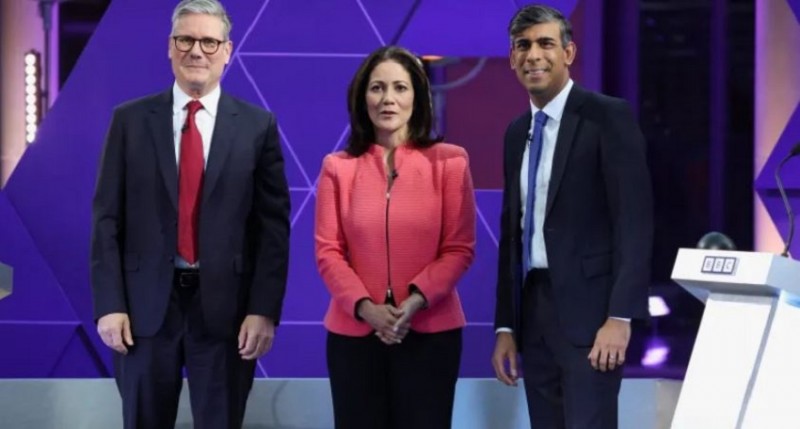
British Prime Minister Rishi Sunak and Labour leader Keir Starmer clashed in their final televised debate before the UK election, discussing key issues like health, immigration, and ethics. The debate, held in Nottingham, was marked by noisy protests outside, making it difficult for the leaders to be heard. This event was Sunak's last major chance to boost his right-wing Conservative Party's chances, as they trail Labour by about 20 points ahead of the July 4 polls.
As the UK gears up for its general election on July 4, Prime Minister Rishi Sunak faces several challenges from Labour Party leader Keir Starmer. Here are five key issues to watch:
Voter apathy is a major concern in this election. While many Brits express a desire for change after 14 years of Conservative rule, they remain skeptical about Labour’s ability to deliver. A YouGov poll shows high unfavorability ratings for both leaders: 72% for Sunak and 51% for Starmer. This has raised doubts about whether disillusioned voters will show up at the polls or stay home, tired of political instability.
Nigel Farage’s Eighth Attempt
Nigel Farage, known for his role in Brexit, has re-entered the political scene as the leader of Reform UK. Despite a surge in polls, the UK’s first-past-the-post system makes a win unlikely for Farage. However, his candidacy for the MP seat in Clacton-on-Sea and his party’s 19% polling could influence key races between the Tories and Labour. Farage’s success or failure could shape the future of his party and its impact on UK politics.
The Conservative Party’s Future
The Conservative Party is facing one of its toughest elections, with predictions suggesting it might win fewer seats than in 1906. Media speculation is rife about potential successors to Rishi Sunak if the party suffers heavy losses. The direction of the party, which has shifted from centrist under David Cameron to right-leaning in recent years, remains uncertain. Some Tories may consider an alliance with Reform UK if Farage’s party performs well.
Scottish National Party’s Struggles
The Scottish National Party (SNP) is in turmoil following the resignation of Nicola Sturgeon and her successor Humza Yousaf lasting only a year. The party is embroiled in a financial probe involving Sturgeon’s husband and lacks a clear strategy for achieving independence. First Minister John Swinney aims to use a majority win in Scotland’s 59 constituencies to push for a new referendum, but Labour’s national momentum poses a significant challenge.
Liberal Democrats’ Unconventional Campaign
The Liberal Democrats, led by Ed Davey, have taken an unconventional approach to their campaign with offbeat stunts and policies focused on pro-European and climate issues. Polling around 12%, the Lib Dems are aiming to increase their seats from 11 in 2019 to up to 67. Such a result would echo their 2010 breakthrough, potentially positioning them as key players in a coalition government.
As the election date approaches, these issues will play a critical role in shaping the political landscape of the UK.
UK Cabinet Minister Admits to Election Betting, What's Next?
UK PM Sunak Warns: Voting for Nigel Farage Could Hand Election to Labour
NATO Takes Charge of Ukraine Arms Aid Amidst Trump Re-Election Concerns
Security Forces Kill Terrorist in Doda Encounter Amid Intensified Operations